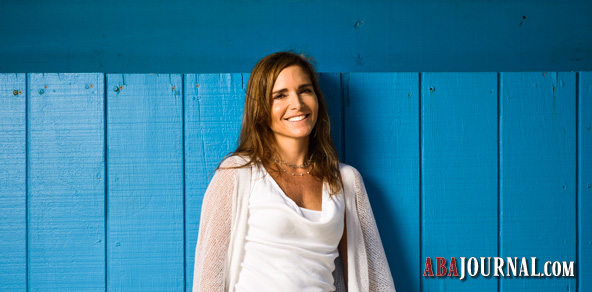
Photo of Michele DeStefano by Jason Myers.
Is there room for globalized collaboration in a traditional law school curriculum? Absolutely, says Michele DeStefano, a University of Miami School of Law professor.
She’s the founder of LawWithoutWalls, a mostly online offering where law and business students from different nations partner with mentors from both professions. The teams develop Projects of Worth that focus on finding solutions for problems in the legal profession.
“What LawWithoutWalls has done is opened my mind to the idea that people around the world have ideas about how legal services and education can be approached differently,” says DeStefano, a 2002 Harvard Law School graduate. “I learn more from the students than they do from me,” adds the single mom of three who writes poetry and teaches indoor cycling classes to unwind.
DeStefano’s idea for LawWithoutWalls came in 2010 when law school dean Patricia D. White approached her about a globalization conference. DeStefano responded with a proposal including meaningful student involvement and participant-created projects that would be discussed in person and online.
The former Leo Burnett account executive workshopped the idea with friends and colleagues, and it grew into LawWithoutWalls. She serves as its founder and co-creator while Michael Bossone, special adviser to the dean, also serves as a co-creator.
“She has an unusual gift for thinking hard about different ways of collaboration,” says White of DeStefano. “For the students, it’s widened their conception of what a legal education can be about.”
LawWithoutWalls kicks off with an in-person meeting at a participating law school.
“It’s two intense days designed to enhance cultural competency, teaming, idea generation and entrepreneurial skills, and to lay the foundation for the virtual work during the semester,” says DeStefano, 44.
Students participate in weekly online courses where projects are debated. The teams also meet online weekly and discuss their own projects. Participants are called by their first names, DeStefano says, to foster egalitarianism, and meeting times change three times during the semester. That way everyone has convenient–and sometimes inconvenient–meeting times regardless of time zones.
In 2013, 17 other law schools participated in LawWithoutWalls. Law and business schools act as partners, along with the London-headquartered law firm Eversheds. Projects have considered developing things like an app that pairs female lawyers for networking purposes, a school for potential general counsel, and emotional intelligence testing for law students.
Work on a 2012 project contributed to development of Chab Dai International’s Freedom Collaborative, a global online platform to connect people who work against human trafficking.
Things wrap up with a ConPosium, where participants gather in person at the Coral Gables, Fla., campus and students present their projects. A panel including venture capitalists, lawyers and academics assesses the work, and the audience weighs in as well through live chat and real-time voting.
Ida Abbott, an Oakland, Calif., lawyer who advises businesses on developing and retaining employees, met DeStefano a few years ago. She now serves as a LawWithoutWalls mentor.
“She was thinking about things that nobody I talked to was thinking about,” says Abbott, “like bringing people from around the world together and having them work on a shared problem.
“I knew within a few minutes of talking to her she’d pull this off. She had a very clear vision, and when I asked her questions she had answers.”